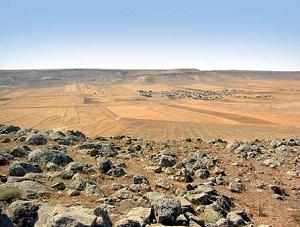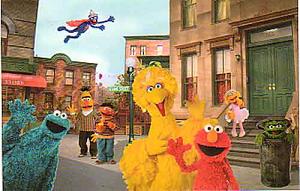9 Things I Learned in 2009 - Page 2
It's 2010 now, and has been for the last month. Alas, I have recently moved and was disconnected from the Internet during most of that time. This is why my blog has been missing for several weeks now, and why I haven't yet done my traditional end-of-the-year blogs. I'm back now, however, and ready to get started once again. So, with a simple apology for tardiness and without any further ado, I present to you the nine things I learned in 2009.
Too many people dismiss bias too easily
 | | Pictured: clear evidence of global warming |
No matter how much you don't want to admit it, you are biased. Everybody is biased, and there is absolutely no such thing as an unbiased news report. Our society rightfully values empiricism and pretends to strive for a fair evaluation of the truth. Unfortunately, where politics and religion are concerned, few of us seem interested in honest, skeptical inquiry.
This became more clear to me last year when it comes to the theory of man-made global warming. There are alarmists and denialists on both sides of the issue, and it is nearly impossible for the average person to parse through the angry chatter and find the truth of the matter. I attempted to take a clear analysis of the subject--and was very upfront with my own bias--and was accused of all sorts of unsavory things I am too proud to recount here. It's as if admitting my bias was automatically announcing to the world that I was wrong. Since everybody is biased--and everybody is biased--this is highly illogical. If a = b = c, then everybody is wrong about everything.
And then the ClimateGate scandal broke with the quietest thud of all time. Here was evidence of a massively unscientific cover-up within the climate science community, but it didn't change a single mind on the issue. Not one. Global warming alarmists had plenty of talking point rationalizations, and denialists used ill-timed hyperbole (for example, calling it the "final nail in the coffin" of anthropogenic climate change) that utterly ruined any traction the story could have gathered. Immediately after the scandal succeeded in doing absolutely nothing whatsoever, the international summit on climate change at Copenhagen was snowed out. Even the shivering world leaders refused to admit that the coldest winter in twenty years could in any way refute the theory that the world is getting hotter and hotter at a record speed. Then, finally, the head of the IPCC admitted that there were factual errors in the much-touted report-to-end-all-reports on the matter, and yet, again, the alarmists called it no big deal while continuing to throw the report in the face of any skeptic. Denialists, for their part, continue to give the real skeptics a bad name.
But it wasn't just global warming. Our current presidential administration, whenever anybody questions what it is doing, is eager to dismiss any doubt as the result of misinformation and biased news reporting. For months, it was even waging war with Fox News. While Fox News is hardly the "fair and balanced" bastion it claims to be, it is still perfectly entitled to its right of free press, and it can hardly be blamed for every skeptical question being thrown at the president.
It all goes back to a simple principle: we shouldn't be so quick to dismiss bias simply because it is biased. One good way to get at the truth, for example, is to look at two or three sides of an argument--all openly biased--and decide which side seems the most reasonable. This is only a starting point, of course, but it's one that shouldn't be stifled by anger, bigotry, and assumption.
That whole thing about grandparents playing the Wii is actually true
 | | Nintendo's Wii Stroke: it's just like having a real stroke, but without all the permanent side effects |
Last year, I recounted how disappointed and forsaken Nintendo has made me, a hardcore gamer, feel. Excellence seems to be low on the company's list of priorities, while big name games like Zelda and Metroid are few and painfully far between. The Wii has become a console of shovelware, and while that may be great for five-year-olds, it's painful for a life-long Nintendo fanboy to watch.
This year, I moved in with my parents and plugged my Wii up to their television. My mother became a Wii Sports Resort fanatic overnight. She would come home from work and immediately start playing it, obsessively looking for all the colorful baloons or perfecting her frisbee throw. Even my grandparents got interested in it, briefly, so they could try out bowling (I suppose fragile hips do make the experience better at home). Since this happened, my mother has gotten her own Wii, has bought one for her other grandchildren (my nephews and newborn niece), and keeps asking me my opinion of the latest crappy game to include a chicken gun.
So I guess the Nintendo strategy really does work, and this year is the first time I've seen it with my own eyes. Non-gamers can get horribly enthused by the Wii and don't seem to care that the games are simplistic, poorly designed, and buggy as Hell. It's fun, and for them, that's all that matters. I can nod and be happy for Nintendo--and can even play the occasional Wii game--but in the end, I don't think of myself as the Nintendo fanboy I used to be.
There really is a world-wide water crisis
 | | Basically, it turns once fertile land into a Martian landscape |
I consider myself a skeptic, and don't really believe in things like psychics, ghosts, homeopathy, or trancendental meditation. I'm also not convinced that global warming is real (NOTE: my opinion on this matter has certainly changed over the years since this was written). Earlier in the year, it occured to me that I've always taken for granted the notion that there is a world-wide water crisis and that in the future, wars will be waged for control of water. The more I thought about it, the less sense it made to me, so I decided to do my own research and find out if there is any truth to this common belief.
As it turns out, it's much worse than most people know. Wars are already being waged in certain parts of the world for control of water, and we aren't getting any closer to a solution to the problem. You see, there's this thing called desertification, where the land literally dries up as a result of overpaving, depleting the ground water, damming and redirecting rivers, and excessive exportation of water. Once the land has been dried up, it would take at least several decades to reclaim it, if there were anybody around to do the reclaiming. In effect, throughout the world, the land is getting drier and drier, and our only response seems to be the creation of bottled water, which only accelerates the process by shuffling the water around needlessly.
In the third world, where most of the available water is polluted and toxic (beyond the help of any stupid filter, regardless of what certain bottled water companies want you to believe), this is a serious concern. For example, more people are dying in Africa from thirst than are dying of hunger and malaria. Now the World Bank is getting involved, and if you know anything about the honesty and effectiveness of the World Bank, you can guess how much good that's doing.
I'm not an alarmist, however. I don't believe this is going to lead to an apocalypse or world war. Technology is progressing at an astounding rate, and people in dry areas are already rising up against the forces that would take away their water supplies. I believe in the power of ingenuity and charity, and I think it is only a matter of time before water becomes wholly sustainable again. My only hope is that this happens before we start treating water the way we treat oil.
People who have done drugs should not be exposed to very much children's programming
 | | You could look at each character as typical of certain drugs; for instance, Super Grover up there is flying high on PCP while Cookie Monster, of course, has an eternal case of the munchies |
Okay, I freely admit that, while in college, I took drugs. I stopped taking them before I graduated (indeed, I probably wouldn't have graduated had I continued), and I certainly don't take them anymore. But I've done drugs in the past, which has permanently skewed my perception of reality, for better and for worse.
How I view children's television programming falls firmly in the "for worse" category. Seriously, kid shows are fucked up. Take Sesame Street for example. Just the other day, I watched as Sarah Jessica Parker appeared in a particularly tight sweater to teach Elmo the meaning of the word "pair," followed by Bert and Ernie singing a song about Bert's "ding-a-ling-a-ling-dong" and Ernie's "dinger" while their furniture danced around the room in a whirlwind of mania. Then Elmo appears in a trippy netherworld of crayon-soaked madness to talk to his fish and count how many sheep are driving tractors through his living room. If I had been on drugs while watching all of this, I'd probably be in a mental hospital right now.
And don't even get me started on other shows that make Sesame Street look tame. I still have Teletubbies flashbacks, and I wouldn't wish those upon my worst enemy.
-e. magill 2/6/2010
|
|